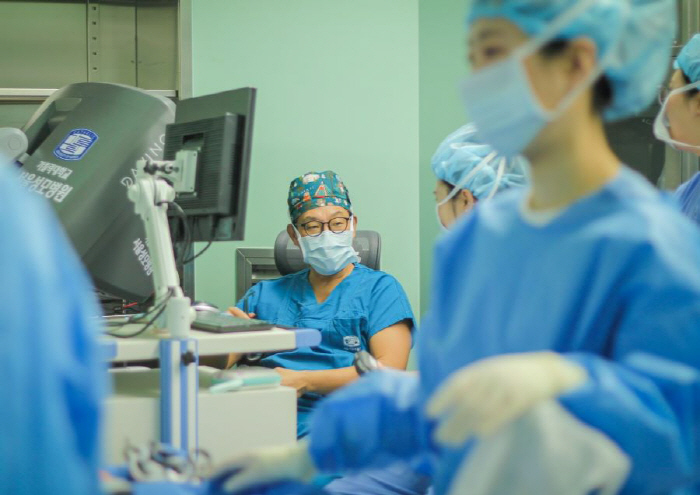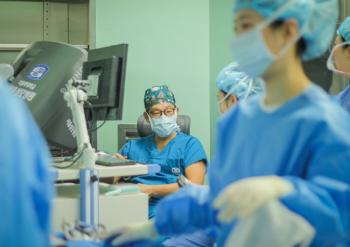Single-hole robotic surgery for colon cancer, less bleeding and complications than single-hole laparoscopy
Nov 14, 2025
Recently, minimally invasive surgery has been attempted in various diseases and is becoming a new standard, and a study comparing and analyzing the results of colorectal cancer patients treated with single-hole laparoscopy and single-hole robotic surgery has been published in international journals.
A multicenter research team led by Lee Yoon-seok (colon anastomotic surgery) at the Colon Cancer Center at the Catholic University of Korea's Seoul St. Mary's Hospital announced the results of a multicenter matching cohort study that single-hole robotic surgery has faster recovery and higher surgical stability than single-hole laparoscopic surgery. This is the first multi-center comparative study that accurately compares the two minimally invasive surgical methods that are actively applied in the medical field in the 21st century with statistical analysis.
The research team retrospectively analyzed the data of single-hole robotic surgery patients performed at senior hospitals (Catholic University, Kyungpook National University, Ulsan National University, and Ewha Womans University) belonging to four medical schools from March 2019 to April 2023. They extracted 185 single-hole robotic surgery and 179 single-hole laparoscopic surgery from the entire cohort through propensity score matching, and then performed 1:1 matching of gender, age, body mass index, American Society of Anesthesiologists, abdominal surgical history, and tumor location as covariates (variables that can affect outcomes) to form a comparable group of 95 single-hole robotic surgery and 86 single-hole laparoscopic surgery. The target disease was limited to right colon without metastasis or S-phase colon adenocarcinoma (stage 1 to stage 3).
The results showed that the stability of single-hole robotic surgery was prominent in key surgical indicators. The mean surgical time was similar in both groups to about 180 minutes, but ▲estimated hemorrhage was reduced to less than half in robotic surgery (72.1 mL in laparoscopy and 33.7 mL in robots), and ▲astrooper conversion to other procedures also recorded one-sixth of that in single ball (12.8% in laparoscopy and 2.1% in robots). ▲The complications during surgery were 0% for single-hole robots compared to 7.0% for single-hole laparoscopy, and the precision and operability provided by the robot platform seem to have contributed to the improvement of surgical stability.
Single-hole laparoscopic surgery has the challenges of instrumental triangulation loss (a phenomenon in which all instruments enter one hole in a single-hole surgery, disappearing three-dimensional manipulation angles, and limiting vision and manipulation). However, the Da Vinci robotic surgery system can solve the problem by inserting several freely bending instruments into a single port, allowing the instrument to move at different angles even in the body.
In addition to the matching cohort, the research team additionally performed an inverse probability of treatment weighting (IPTW) analysis using the entire sample, and the results of the analysis also confirmed that stability such as bleeding reduction, conversion reduction, and complications during surgery in single-hole robots is proven.
This study is considered to have demonstrated that technical advantages have led to the advantage of reducing bleeding and conversion during surgery and accelerating recovery through clinical indicators of multi-center matching analysis beyond the limits of a small number of cases. However, the technological heterogeneity between medical institutions and differences in some criteria, which are limitations of multicenter research, were cited as limitations to be considered when interpreting.
Professor Lee Yun-seok "Multi-center data confirmed that single-hole robotic surgery can increase stability and precision during surgery, reducing bleeding and conversion to other surgeries and accelerating patient recovery.""If grades are verified through standardized protocols and long-term tracking in the future, robotic surgery will be able to establish itself as a viable alternative to minimally invasive colon cancer surgery" he predicted. The study was recently published in the international journal Surgical Endoscopy.
A multicenter research team led by Lee Yoon-seok (colon anastomotic surgery) at the Colon Cancer Center at the Catholic University of Korea's Seoul St. Mary's Hospital announced the results of a multicenter matching cohort study that single-hole robotic surgery has faster recovery and higher surgical stability than single-hole laparoscopic surgery. This is the first multi-center comparative study that accurately compares the two minimally invasive surgical methods that are actively applied in the medical field in the 21st century with statistical analysis.
The research team retrospectively analyzed the data of single-hole robotic surgery patients performed at senior hospitals (Catholic University, Kyungpook National University, Ulsan National University, and Ewha Womans University) belonging to four medical schools from March 2019 to April 2023. They extracted 185 single-hole robotic surgery and 179 single-hole laparoscopic surgery from the entire cohort through propensity score matching, and then performed 1:1 matching of gender, age, body mass index, American Society of Anesthesiologists, abdominal surgical history, and tumor location as covariates (variables that can affect outcomes) to form a comparable group of 95 single-hole robotic surgery and 86 single-hole laparoscopic surgery. The target disease was limited to right colon without metastasis or S-phase colon adenocarcinoma (stage 1 to stage 3).
The results showed that the stability of single-hole robotic surgery was prominent in key surgical indicators. The mean surgical time was similar in both groups to about 180 minutes, but ▲estimated hemorrhage was reduced to less than half in robotic surgery (72.1 mL in laparoscopy and 33.7 mL in robots), and ▲astrooper conversion to other procedures also recorded one-sixth of that in single ball (12.8% in laparoscopy and 2.1% in robots). ▲The complications during surgery were 0% for single-hole robots compared to 7.0% for single-hole laparoscopy, and the precision and operability provided by the robot platform seem to have contributed to the improvement of surgical stability.
Single-hole laparoscopic surgery has the challenges of instrumental triangulation loss (a phenomenon in which all instruments enter one hole in a single-hole surgery, disappearing three-dimensional manipulation angles, and limiting vision and manipulation). However, the Da Vinci robotic surgery system can solve the problem by inserting several freely bending instruments into a single port, allowing the instrument to move at different angles even in the body.
In addition to the matching cohort, the research team additionally performed an inverse probability of treatment weighting (IPTW) analysis using the entire sample, and the results of the analysis also confirmed that stability such as bleeding reduction, conversion reduction, and complications during surgery in single-hole robots is proven.
This study is considered to have demonstrated that technical advantages have led to the advantage of reducing bleeding and conversion during surgery and accelerating recovery through clinical indicators of multi-center matching analysis beyond the limits of a small number of cases. However, the technological heterogeneity between medical institutions and differences in some criteria, which are limitations of multicenter research, were cited as limitations to be considered when interpreting.
Professor Lee Yun-seok "Multi-center data confirmed that single-hole robotic surgery can increase stability and precision during surgery, reducing bleeding and conversion to other surgeries and accelerating patient recovery.""If grades are verified through standardized protocols and long-term tracking in the future, robotic surgery will be able to establish itself as a viable alternative to minimally invasive colon cancer surgery" he predicted. The study was recently published in the international journal Surgical Endoscopy.
|
This article was translated by Naver AI translator.














